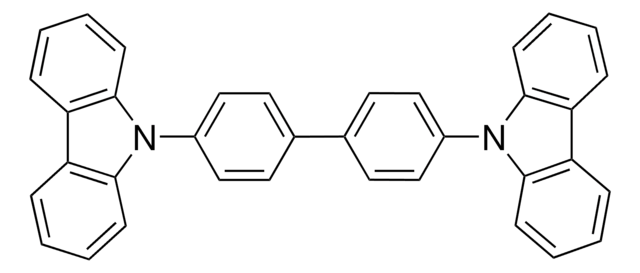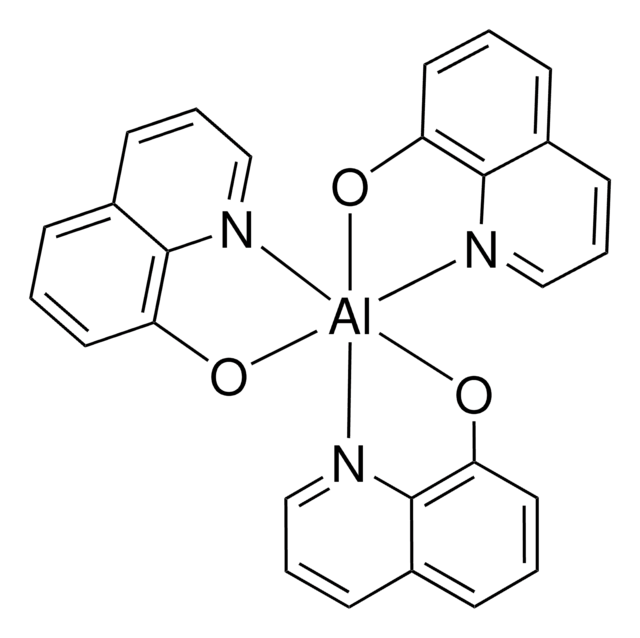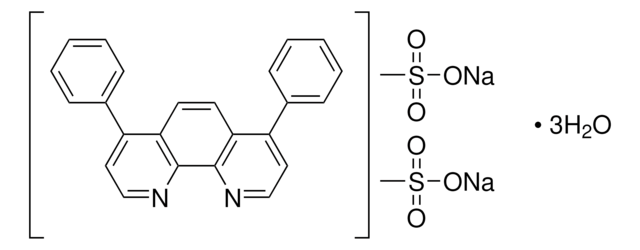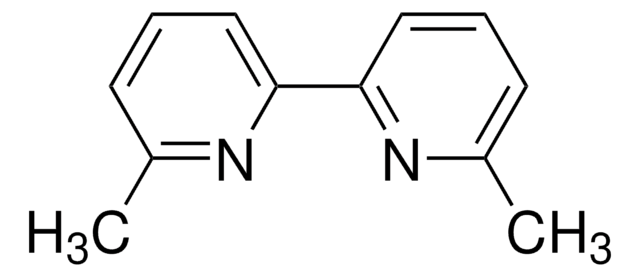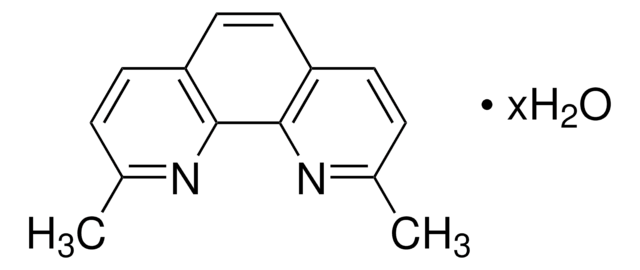140910
Bathocuproin
96%
Synonym(e):
2,9-Dimethyl-4,7-diphenyl-1,10-phenanthrolin, BCP
About This Item
Empfohlene Produkte
Assay
96%
Form
powder
Grünere Alternativprodukt-Eigenschaften
Design for Energy Efficiency
Learn more about the Principles of Green Chemistry.
sustainability
Greener Alternative Product
mp (Schmelzpunkt)
279-283 °C (lit.)
λmax
~280 nm in methanol
Energie der Orbitale
HOMO 7 eV
LUMO 3.5 eV
Leistung von OLED-Bauelementen
ITO/CuPc/NPD/TCTA/mCP:FIrpic (6%)/BCP/LiF/Al
ITO/NPD/CBP:Ir(ppy)3/BCP/Alq3/Mg:Al
ITO/NPD/TCTA/BCPO:Ir(piq)3 (7-8%)/BCP/Alq3/LiF/Al
ITO/NPD/TCTA/BCPO:Ir(ppy)3 (7-8%)/BCP/Alq3/LiF/Al
Grünere Alternativprodukt-Kategorie
, Enabling
SMILES String
Cc1cc(-c2ccccc2)c3ccc4c(cc(C)nc4c3n1)-c5ccccc5
InChI
1S/C26H20N2/c1-17-15-23(19-9-5-3-6-10-19)21-13-14-22-24(20-11-7-4-8-12-20)16-18(2)28-26(22)25(21)27-17/h3-16H,1-2H3
InChIKey
STTGYIUESPWXOW-UHFFFAOYSA-N
Suchen Sie nach ähnlichen Produkten? Aufrufen Leitfaden zum Produktvergleich
Allgemeine Beschreibung
Anwendung
Signalwort
Warning
H-Sätze
Gefahreneinstufungen
Acute Tox. 4 Oral - Aquatic Chronic 4
Lagerklassenschlüssel
11 - Combustible Solids
WGK
WGK 3
Flammpunkt (°F)
Not applicable
Flammpunkt (°C)
Not applicable
Persönliche Schutzausrüstung
dust mask type N95 (US), Eyeshields, Faceshields, Gloves
Hier finden Sie alle aktuellen Versionen:
Besitzen Sie dieses Produkt bereits?
In der Dokumentenbibliothek finden Sie die Dokumentation zu den Produkten, die Sie kürzlich erworben haben.
Kunden haben sich ebenfalls angesehen
Artikel
Professor Shinar (Iowa State University, USA) summarizes the developments of a variety of sensor configurations based on organic and hybrid electronics, as low-cost, disposable, non-invasive, wearable bioelectronics for healthcare.
Professor Chen (Nankai University, China) and his team explain the strategies behind their recent record-breaking organic solar cells, reaching a power conversion efficiency of 17.3%.
Unser Team von Wissenschaftlern verfügt über Erfahrung in allen Forschungsbereichen einschließlich Life Science, Materialwissenschaften, chemischer Synthese, Chromatographie, Analytik und vielen mehr..
Setzen Sie sich mit dem technischen Dienst in Verbindung.



![[6,6]-Phenyl C61 Buttersäuremethylester ≥99%](/deepweb/assets/sigmaaldrich/product/structures/359/221/d990c746-0960-4c69-bf76-fe09b193824d/640/d990c746-0960-4c69-bf76-fe09b193824d.png)

